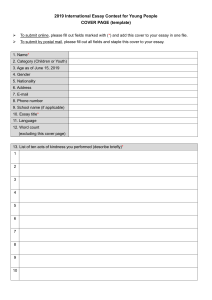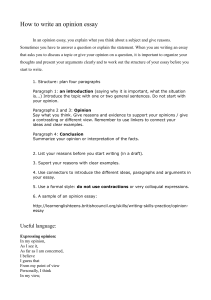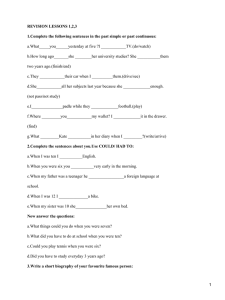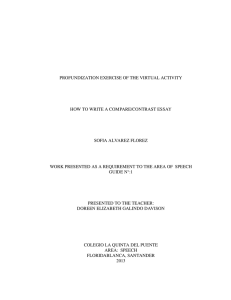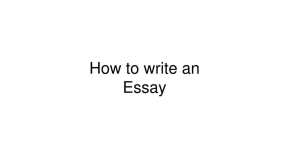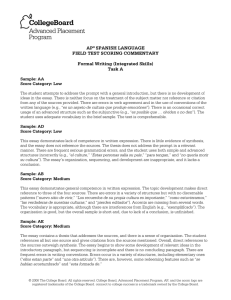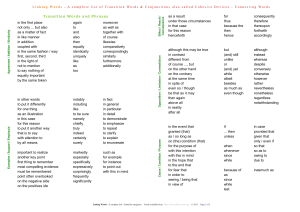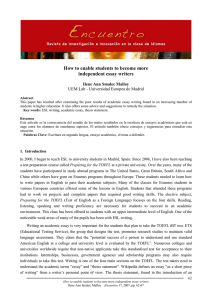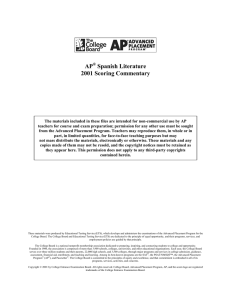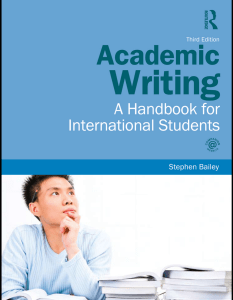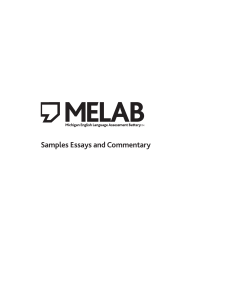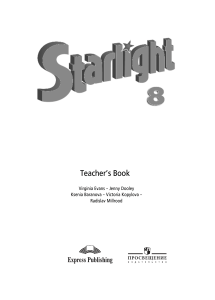Extended Writing - Trinity College London
Anuncio
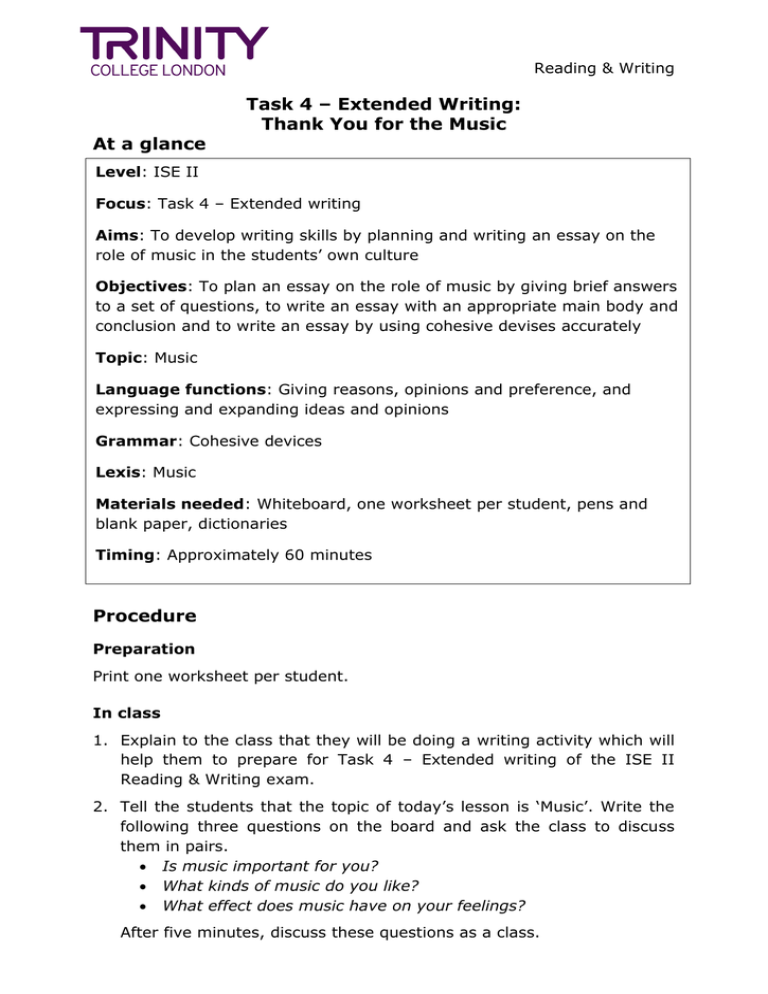
Reading & Writing Task 4 – Extended Writing: Thank You for the Music At a glance Level: ISE II Focus: Task 4 – Extended writing Aims: To develop writing skills by planning and writing an essay on the role of music in the students‟ own culture Objectives: To plan an essay on the role of music by giving brief answers to a set of questions, to write an essay with an appropriate main body and conclusion and to write an essay by using cohesive devises accurately Topic: Music Language functions: Giving reasons, opinions and preference, and expressing and expanding ideas and opinions Grammar: Cohesive devices Lexis: Music Materials needed: Whiteboard, one worksheet per student, pens and blank paper, dictionaries Timing: Approximately 60 minutes Procedure Preparation Print one worksheet per student. In class 1. Explain to the class that they will be doing a writing activity which will help them to prepare for Task 4 – Extended writing of the ISE II Reading & Writing exam. 2. Tell the students that the topic of today‟s lesson is „Music‟. Write the following three questions on the board and ask the class to discuss them in pairs. Is music important for you? What kinds of music do you like? What effect does music have on your feelings? After five minutes, discuss these questions as a class. Reading & Writing 3. Elicit from the students the three parts of a typical essay. Write the answers on the whiteboard Answer Key: Introduction, body, and conclusion Elicit from the students which two parts are shorter and which is the longer one. 4. Ask the students what they should include in an introduction. Write the answer on the whiteboard. Answer Key: Introduction to the topic and context 5. Give each student a copy of the worksheet. Ask the students to read the introduction of Task A (mind-map) and elicit what the topic and context are. Write the answers on the whiteboard. Answer Key: Topic: music Context: the role of music in my own culture 6. Tell the students that the mind-map under Task A will help them organise their writing. Tell the students that they should answer the questions for each part. Tell the students they don‟t need to write full sentences and that they can just write down key words. Ask the students to work alone. Monitor and assist if necessary. 7. When they are finished, tell the students to swap their mind-maps with another student and to add one short answer to each question. Tell the students to give the mind-map back and explain the new information in pairs. Do group feedback and put any new vocabulary on the board. 8. Write “linking words” on the board and elicit some examples. Ask students what the function is of these words. Write down “in addition” and “in summary” and elicit which of these linking words can be found in the conclusion. Tell the students to complete Task B. Tell students that the task has examples of linking words for expanding such as “in addition” and summarising such as “in summary”. Ask the students to write sentences using the cohesive devices. 9. Ask students to write sentences on the board that give one example for each cohesive device. Make the students aware of any errors as they arise and correct them. 10. Give each student a blank piece of paper and ask them to write an essay on the role of music in their culture that has one or two paragraphs and a conclusion. The total word count should be Reading & Writing approximately 250 words. Tell the students they should use the mindmap and they should focus on using cohesive devices for expanding and summarising appropriately. They can keep the introduction that is used in the mind-map. The students can also use a dictionary. 11. Monitor and correct errors. Write up any common errors on the board. 12. When the students have finished writing, ask them to swap their text with another student and tell them to complete Task C. When they have finished reading their partner‟s work they complete the checklist and write a brief comment of one or two sentences about the essay. 13. Carry out group feedback and ask students to read out loud the comment and elicit whether they agree with the comment or not. Ask the students to reflect on how they could improve in the future. 14. Ask the students to look at the common errors you have written on the board. Ask students to discuss each error with their partner and to correct the sentences. Then give open-class feedback. Reading & Writing Extension activity 1. Ask the students to have a discussion in groups of four. Tell them that two students are of the opinion that music is not important in their culture and the other two think that music is important. 2. Ask students to rewrite the introduction. Further support activity 1. Ask weaker students to write example sentences using only a few of the linking words. 2. Allow weaker students to write only one paragraph for the main body. 3. Put weaker students in pairs and ask them to each write one of the paragraphs in the body. Ask them to read each other‟s paragraph and then use the information to write the conclusion together. 4. Ask weaker students to do the brainstorm together. After class 1. Ask the students to look online or in a book for a culture where music plays a very important role. Ask the students to report back in the next class. 2. Ask students to rewrite the essay but now change the topic to the importance of art in general. Tell the students to bring the completed essay with them in the next class. Reading & Writing Student Worksheet Task 4 – Extended Writing: The Role of Music in my Culture Task A: Mind-map Introduction It is fairly safe to say that music is part of every culture. However, the importance of music varies from culture to culture. This essay looks at the role music has to play in my own culture. Body – paragraph 1 What role does music play in your culture? Is there a preference for singing, dancing, performing, …? On what occasions do people in your culture listen to music? What genres are popular? Body – paragraph 2 How does music affect people? How important is music for young people? How important is music for older people? Other information? Conclusion How important is music in your culture? Reading & Writing Task B: Linking Words Write a sentence for each linking word. Expanding 1. additionally: 2. also: 3. furthermore: 4. in addition: 5. moreover: Summarising 1. in conclusion: 2. to conclude: 3. in summary: 4. to sum up: Reading & Writing Task C: Checklist Read your partner’s text and complete the checklist. Circle either Y (Yes) or N (No). My partner has written a main body paragraph. Y/N Y/N My partner has included 2/3 linking words. Y/N My partner has written a conclusion. Y/N My partner has written a total of 250 words. Write a comment of one or two sentences about your partner’s work:
